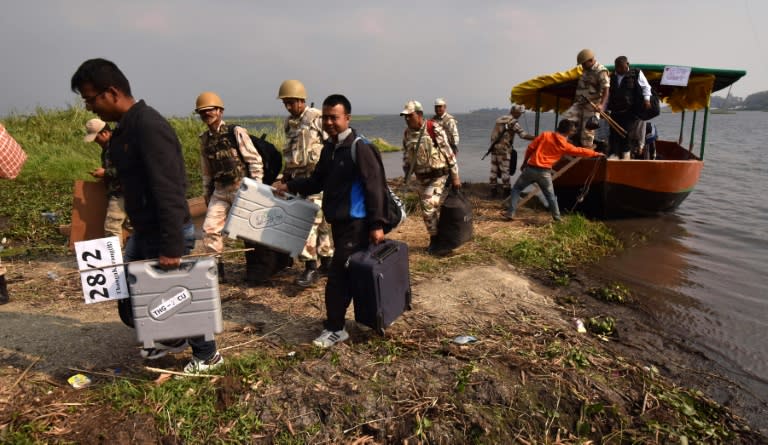Bodies go unburied at election time in India's Manipur
The body of Pausuan Lian has lain in a hospital mortuary for more than 500 days since he was shot dead during a land protest in India's Manipur state but his family is still refusing to allow his burial. "All nine martyrs, including my son, will stay in the morgue until justice is done," his mother Hau Lian Ching told AFP ahead of a two-phase state election in Manipur which begins on Saturday. "The demands of our people must be met before we can bury them." The 18-year-old was one of six people who were killed in August 2015 when police opened fire at a rally in the mainly tribal Churachandpur district against three land bills that had been introduced in the state assembly. A subsequent flare-up in violence left another three locals dead and further highlighted the tensions in the remote northeastern state, a three-hour flight from New Delhi. Like much of the northeast, Manipur -- which shares its eastern border with Myanmar -- has long been plagued by sporadic separatist unrest and ongoing feuds between different tribal and ethnic groups. But the deaths in Churachandpur have heightened the anger of tribal groups who had already come to regard the land bills as part of a plot by the majority Meitei community to deprive them of their ancestral rights. A group from one of the state's largest minority tribes, the Naga, launched a blockade of the main highway into the state capital Imphal in November, leading to shortages and big price hikes for basic commodities. - Military airlifts - The government has even had to deploy military aircraft to deliver fuel and other essential supplies. But the most poignant protests have been at Churachandpur hospital morgue where relatives such as Haulian Ching and her other son Kailunlai steadfastly refuse to leave the side of their loved ones. "Until we receive guarantees that our land will not be touched we will continue with our vigil," said Kailunlai, a farm labourer. "The government tried to steal our land and take away our rights ... We are only asking for what we are entitled to under the Indian constitution." Supporters of the bills at the centre of the controversy say the legislation will regularise a system of buying and selling land. But opponents say it will effectively end the tribal groups' sovereign rights over their land which they argue is enshrined in the Indian constitution. While the bills have been passed by the Manipur state legislature, where the centre-left Congress party has a majority, they have yet to be approved by President Pranab Mukherjee. Opponents are pinning their hopes on the elections as a way to get the bills blocked for good. The main threat to Congress comes from the right-wing Bharatiya Janata Party led by Prime Minister Narendra Modi who has pledged to end the blockades without clarifying his position on the land bills. "Congress will have to answer for all the sufferings of the people due to blockade," Modi said at a rally in Imphal last weekend. "When the BJP forms the next government in Manipur, we will not allow any blockade and show how to run a government." The Hindu nationalist BJP's main support base has traditionally been in northern and western India, but it won power in the largest northeastern state, Assam, last year. But while Congress is struggling on a national level, the three-time Chief Minister Okram Ibobi Singh remains Manipur's most popular politician which could help his party get over the line. - Demand for justice - H. Mangchinkhup, a leader of the campaign against the legislation, said the state's rulers not only had to address the concerns about the legislation but also bring the killers of the protestors to justice. "Our condition for burying the dead -- who gave up their lives for our dignity, ancestral lands and rights -- remains the same," Mangchinkhup told AFP. "The government needs to assure they will safeguard our rights and justice should be done to those who shot our people." The elections in Manipur are being held in two phases -- the second round is on Wednesday -- and are part of a flurry of polls in five Indian states. Results of all the contests are expected on March 11.




